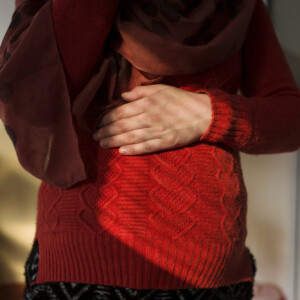Re-thinking maternity care in Kyrgyzstan during COVID-19
Healthcare workers overcome fear with trust, training and up-to-date guidance
© GIZ/Maxime Fossat
When COVID-19 hit Kyrgyzstan, healthcare workers providing care to pregnant women and newborns were no longer sure how to do their jobs safely. With German support, teams in maternity hospitals have reorganised the way they work to protect themselves and their patients from COVID-19. This article, the second in a series, explains how.
Last April, as SARS-CoV-2 began to spread in Kyrgyzstan, it wasn’t only personnel at primary health care facilities who were unsure how to protect themselves from infection. Staff at maternity hospitals were also at a loss. Steady streams of pregnant women continued to arrive to give birth and there was little time to stop and think. How should the women be triaged? If a pregnant woman showed symptoms of COVID-19, or had been in contact with an infected person, should she be managed differently than others? And what about the risk of aerosol transmission, especially in delivery rooms where labouring women and midwives come into close and prolonged contact?
Online training sessions on hygiene and clinical care for maternity hospitals

Working on behalf of Germany’s Federal Ministry for Economic Cooperation and Development (BMZ), the GIZ-implemented Promotion of Perinatal Health project quickly re-oriented its core activities to help doctors, nurses and midwives in maternity hospitals respond to the new challenges posed by COVID-19.
Since early 2019 two advisors with the project had been mentoring multi-disciplinary teams of clinicians in 13 health facilities to systematically improve the quality of care provided to mothers and their babies. This continuous engagement had helped to create a relationship of trust – and a willingness to talk openly about challenges. ‘The situation in the hospitals was difficult,’ explained Chinara Kazakbaeva, one of the mentors. ‘As the COVID outbreak intensified, we offered our help.’
The new manager of the project, Valerie Broch Alvarez, consulted with German obstetrician-gynaecologists at the Klinikum Westbrandenburg, which works in a BMZ-supported hospital partnership with the National Center for Maternity and Childhood Care in Bishkek, to learn how they were caring for pregnant women during the pandemic. Based on their experiences, it was clear that the general COVID-19 protocols issued by the Ministry of Health in Kyrgyzstan needed to be adapted to the specific needs of maternity hospitals in order to protect both health care workers and patients.

The project team began working with experts at EPOS and EvaPlan, German consulting firms, to develop 12 online training sessions on topics where the maternity teams urgently needed specialised guidance and training. One area of focus was the clinical management of pregnant women and neonates in the context of COVID; another was hygiene and infection prevention and control. Seventy healthcare workers from 16 different maternity facilities across Kyrgyzstan received professional development credit after completing the training sessions.
‘The specialists in maternity hospitals had never really had to think about airborne viruses,’ explains Jyldyz Turgunbaeva, a technical advisor with GIZ. ‘At first they were lost. Our support helped them to think through their internal processes as a team – not just what to do, but who should do it and when.’
Up-to-date guidance on COVID-19 for midwives and nurses in remote areas
The project also worked with the Denmark-based Maternity Foundation to adapt a clinical module on COVID-19 for users of the Safe Delivery App, a digital resource for midwives and nurses. The app, which is used in more than 40 countries around the world, was launched in Kyrgyzstan in May 2019 with support from project. Divided into 12 modules, it provides health care workers with direct and instant access to clinical guidelines and protocols on Basic Emergency Obstetric and Neonatal Care.

The new COVID-19 module, which is now available in both Russian and Kyrgyz, provides users with up-to-date guidance on the symptoms of COVID-19, how to care for women with COVID-19 during pregnancy and birth, and how to minimise the spread of infections in health facilities. In the rapidly changing context of an epidemic, the app is particularly important for ensuring that midwives and nurses based in remote areas have access to the most current clinical guidelines.
Panic gives way to resolve – and action
During the whirlwind first months of the pandemic, staff with the German-supported health project were trusted partners for teams at maternity hospitals as they sought practical solutions to the challenges posed by COVID-19. While it was not feasible to fill every gap, they were able to work together to better organise core processes and to adapt generic guidelines and protocols to the specific needs of teams providing care to pregnant women, new mothers and newborns.
Jyldyz Turgunbaeva and the mentors working with the maternity teams have noticed that the initial feeling of panic has diminished as the hospitals have taken concrete steps, such as reorganising their triage facilities and designating special rooms for pregnant women with suspected or confirmed cases of COVID. ‘The changes are small, but they are there,’ says Turgunbaeva. ‘Perhaps most important is the shift in attitude. As a result of the pandemic, the teams in the facilities have seen that it is up to them to implement changes to make their lives easier and safer, and they have started to do it.’
Karen Birdsall, January 2021
